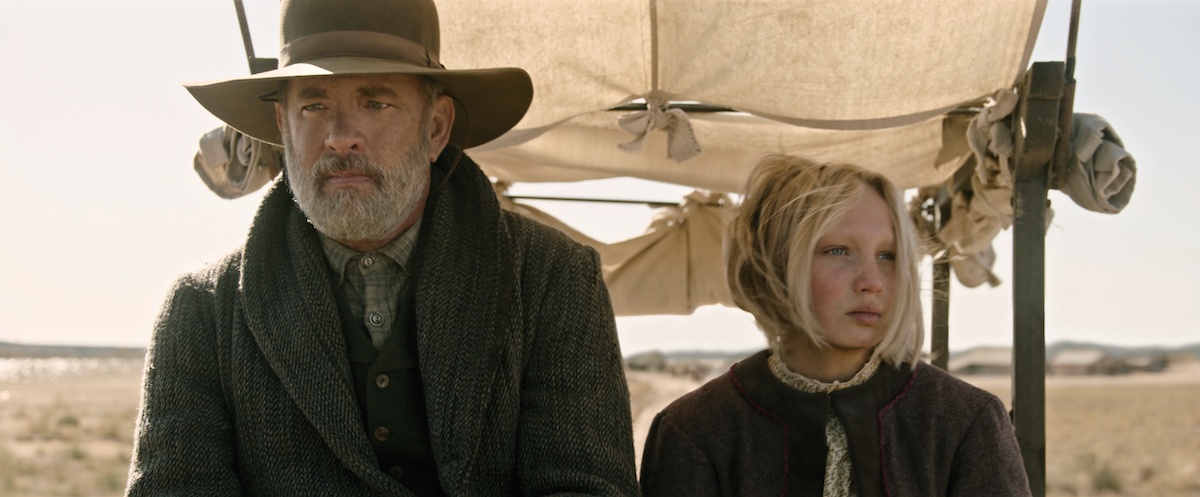News of the World tells the story of Captain Kidd (Tom Hanks) in middle America, post-civil war, who plods between small towns delivering the news and stories of the country. His equilibrium is thrown off balance when he meets Johanna (Helena Zengel), a young girl who had been captured by the Kiowa tribe. The film follows his endeavours to take her back to her family.
Director, Paul Greengrass, who previously collaborated with Hanks on Captain Phillips, dominates with an impressive set and costume design, making audiences feel like they’re witnessing an American Gothic painting brought to life and stretched over two hours. By night, we are presented with some fantastic stills of midnight ghost towns, moon-lit shudders, amber windows and oil lamps, sparking a dark and brooding atmosphere. By day, we are immersed into the verisimilitude of a comical Wild Wild West town; the perpetually muddy main strips, bustling saloons, neighing stables, bells chiming, people whistling, the clatter of villagers starting their day – a buzzing hive smothered by the epic American landscape.
Dariusz Wolski’s cinematography and his use of wide-angle frames is accentuated by some gorgeous images of the twilight hours and its rising purple tones casting shadows over the hills, creating a beautifully placid fragrance in the air.
Hanks and Zengel wear their roles well, particularly Hanks, who is renowned for his humbleness and good nature, makes for a perfect fit as a paternal character. The film’s first old-school, fun cowboy shootout with some rugged bandits and a creatively horrific alternative to gunpowder pushes our familiarity with Mr Beloved Worldwide as a heroic gunslinger but does not disappoint.
Greengrass plays it very safe in News of the World, which makes it hard to flesh out any valid flaws. However, some complacencies present themselves, such as within its dialogue. When a shady, menacing crew try to take Johanna off Captain Kidd’s hands for a price, which results in an altercation, one of the members threatens him saying “I’ll be seeing you Captain…I’m coming for you as soon as I’m done with these blues”. Not only is this on-the-nose, but it also frustratingly spoils the possible element of surprise later on in the narrative with his return, as we already know from this confrontation that he presents himself as a potential antagonistic conflict, resulting in what is some pretty complacent writing.
Captain Kidd’s quest in bringing the news of the country to these isolated, bubbled village communities resembles a lighthouse beacon illuminating the scary unknown abyss of the expansive lands of America for its disconnected sleepy towns in an age of tremendous darkness before a world of technology, science (labelling the misunderstood as ‘cursed’), mass-communication (other than ‘word is’) and humanitarian justice. This metaphorical plague is manifested in and personified by our two protagonists, who are both isolated and wrestling with an existential ambiguity over where they belong and where they ought to go.
News of the World doesn’t conquer any new grounds or put itself up to any real risk but instead communicates a very necessary sentiment. The timeless power of stories is what triumphs here. His stories are the only light that echoes through a country muffled by darkness, a country riddled by desperate turbulence, confusion and anger, in need of severe enlightenment and escapism, whilst on the brink of a new era. For these reasons, News of the World couldn’t have come out at a better time.
Image Credit: Roger Ebert

